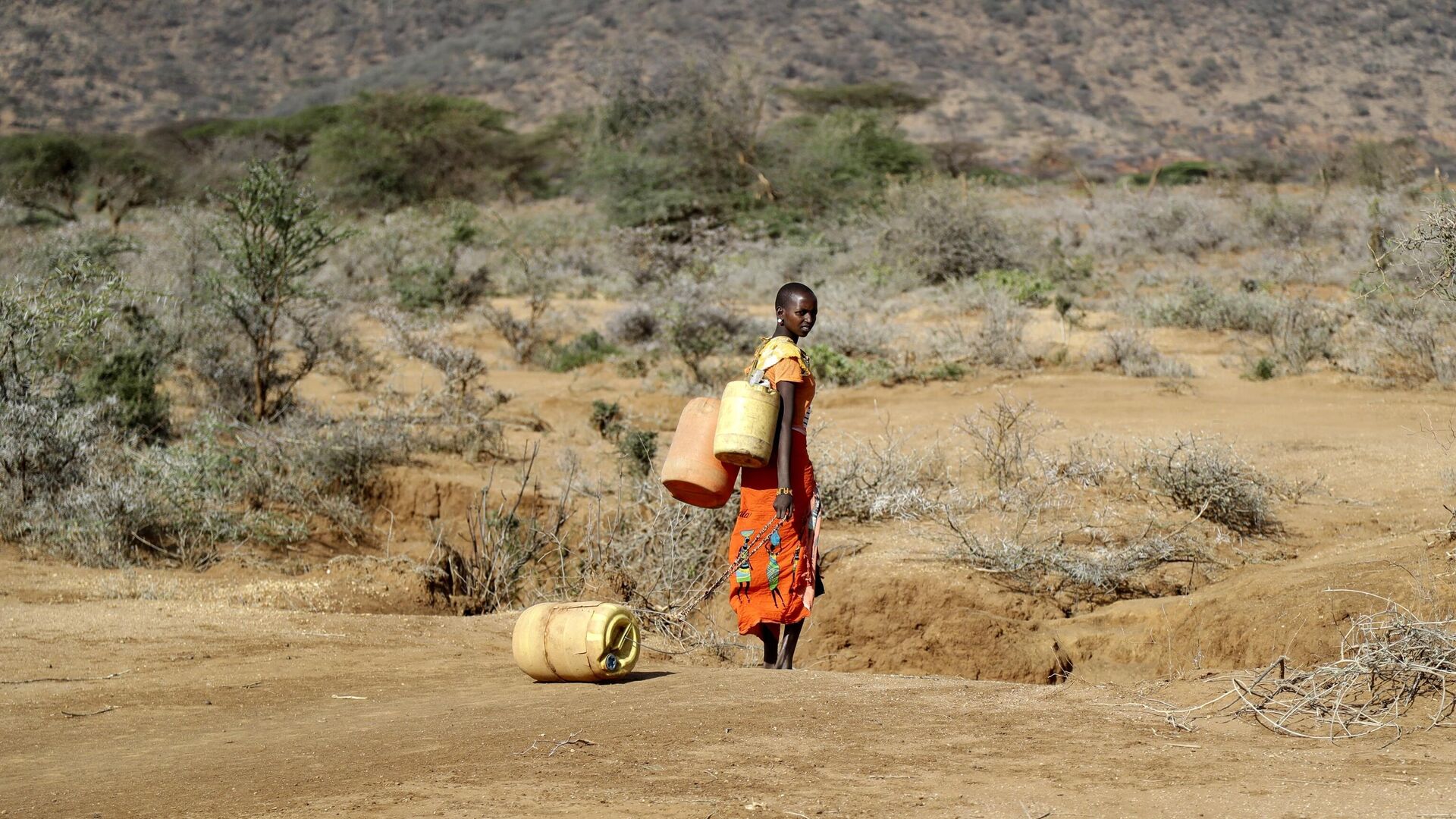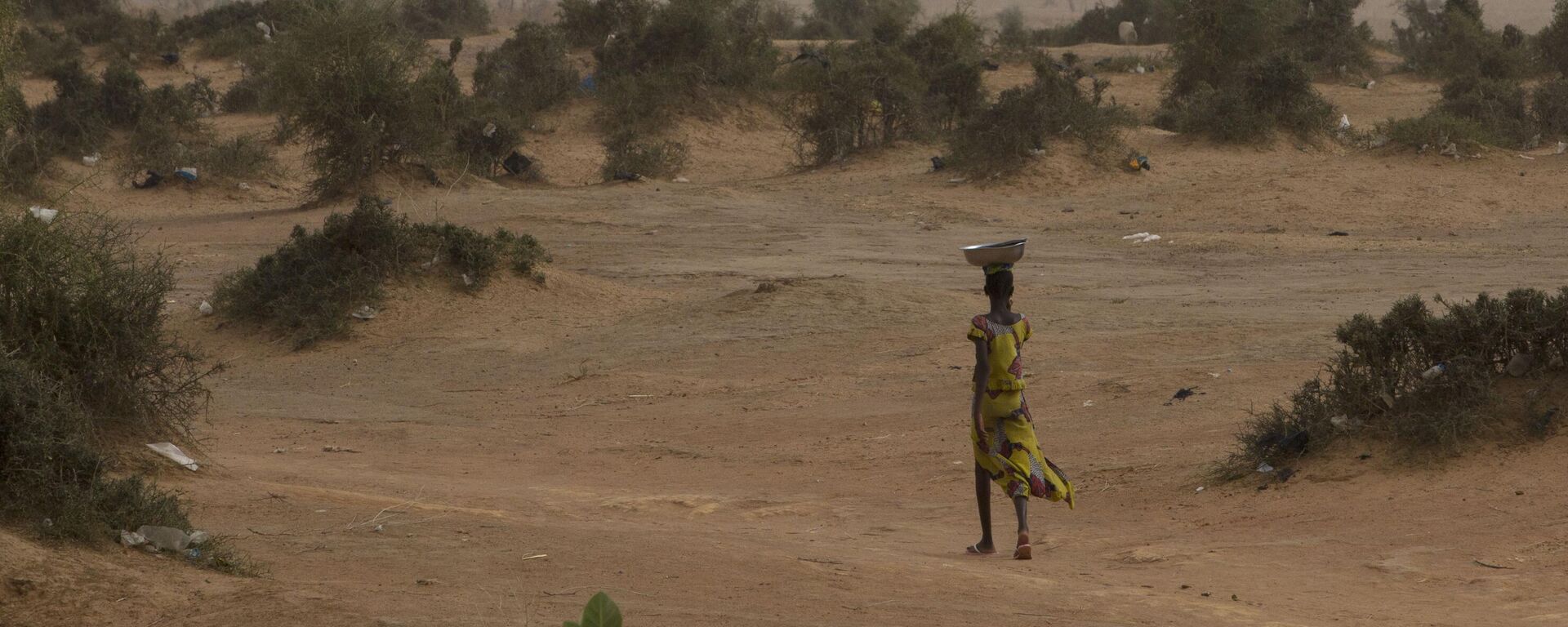https://en.sputniknews.africa/20230428/climate-change-made-exceptional-drought-in-horn-of-africa-even-worse-study-reveals--1058908168.html
Climate Change Made 'Exceptional Drought' in Horn of Africa Even Worse, Study Reveals
Climate Change Made 'Exceptional Drought' in Horn of Africa Even Worse, Study Reveals
Sputnik Africa
The severe drought that hit the Horn of Africa, worsening socio-economic situation and in particluar food security in the region, has been exacerbated by human-induced climate change, a recent study has revealed.
2023-04-28T15:19+0200
2023-04-28T15:19+0200
2023-04-28T15:19+0200
sub-saharan africa
east africa
horn of africa
somalia
kenya
ethiopia
climate change
drought
https://cdn1.img.sputniknews.africa/img/07e7/04/1c/1058907404_0:160:3072:1888_1920x0_80_0_0_bc5ecef13934a7ff58f8f37e7cd752d7.jpg
The severe drought that hit the Horn of Africa, worsening socio-economic situation and in particular food security in the region, has been exacerbated by human-induced climate change, a recent study has revealed. The research was published by the World Weather Attribution, an academic collaboration that studies how climate change influences extreme meteorological events such as heat waves, droughts, or storms. To identify whether climate change was a driver of the drought, the study analyzed rainfall over the most drought-affected region in the southern part of the Horn of Africa for 24 consecutive months, from January 2021 to December 2022. It was noted that the Southern Horn of Africa, encompassing southern Ethiopia, southern Somalia, and eastern Kenya, saw below average rainfall during the timeframe indicated above. The study revealed that low rainfall recently observed in the region - also known as meteorological drought - have become about twice as likely because of human-induced climate change. The researchers further elaborated that climate change affected other aspects of the drought, including the agricultural one, which "influences how much water is available for plants".Noting that today’s climate has been warmed about 1.2°C by human-induced greenhouse gas emissions, the researchers analyzed the role of temperature in the current drought: they indicated that the combination of low rainfall and high evapotranspiration would not have caused a drought "in a world that was 1.2°C cooler".The study underlined that communities that are engaged in rain-fed agriculture and pastoralism are more exposed to the negative effects of drought and are among "the most severely affected groups when crop and livestock health decline." It was also mentioned that for people in Somalia in particular, the situation has been exacerbated by conflict and state fragility. According to the UN, the present drought that struck the Horn of Africa has resulted in substantial harvest failure, poor pasture conditions, livestock losses, and water shortages. The drought was described as the worst climate change-related disaster seen in at least 40 years, affecting almost 37 million people.
https://en.sputniknews.africa/20230308/1058907577.html
east africa
horn of africa
somalia
kenya
ethiopia
Sputnik Africa
feedback@sputniknews.com
+74956456601
MIA „Rossiya Segodnya“
2023
News
en_EN
Sputnik Africa
feedback@sputniknews.com
+74956456601
MIA „Rossiya Segodnya“
Sputnik Africa
feedback@sputniknews.com
+74956456601
MIA „Rossiya Segodnya“
east africa, drought, horn of africa, study, climate change
east africa, drought, horn of africa, study, climate change
Climate Change Made 'Exceptional Drought' in Horn of Africa Even Worse, Study Reveals
Since October 2020, large areas of East Africa have been experiencing extended dry conditions. According to the UN, the situation in the Horn of Africa is unprecedented as four consecutive rainy seasons have failed to materialize, leaving millions of people in dire need for humanitarian aid.
The severe drought that hit the Horn of Africa, worsening socio-economic situation and in particular food security in the region, has been exacerbated by human-induced climate change, a recent study has revealed.
"Climate change has made events such as the current drought much stronger and more likely; a conservative estimate is that such droughts have become about 100 times more likely," the study stated.
The research was
published by the World Weather Attribution, an academic collaboration that studies how climate change influences extreme meteorological events such as heat waves, droughts, or storms. To identify whether climate change was a driver of the drought, the study analyzed rainfall over the most drought-affected region in the southern part of the Horn of Africa for 24 consecutive months, from January 2021 to December 2022.
It was noted that the Southern Horn of Africa, encompassing southern Ethiopia, southern Somalia, and eastern Kenya, saw
below average rainfall during the timeframe indicated above.
The study revealed that low rainfall recently observed in the region - also known as meteorological drought - have become about twice as likely because of human-induced climate change. The researchers further elaborated that climate change affected other aspects of the drought, including the agricultural one, which "influences how much water is available for plants".
Noting that today’s climate has been warmed about 1.2°C by human-induced greenhouse gas emissions, the researchers analyzed the role of temperature in the current drought: they indicated that the combination of low rainfall and high evapotranspiration would not have caused a drought "in a world that was 1.2°C cooler".
"In today’s climate, the same event is now classified as an exceptional drought, with major crop and pasture losses and widespread water shortages," read the study.
The study underlined that communities that are engaged in rain-fed agriculture and pastoralism are more exposed to the negative effects of
drought and are among "the most severely affected groups when crop and livestock health decline." It was also mentioned that for people in Somalia in particular, the situation has been exacerbated by conflict and state fragility.
According to the UN, the present drought that struck the Horn of Africa has resulted in substantial harvest failure, poor pasture conditions, livestock losses, and water shortages. The drought was described as the worst
climate change-related disaster seen in at least 40 years, affecting almost 37 million people.


